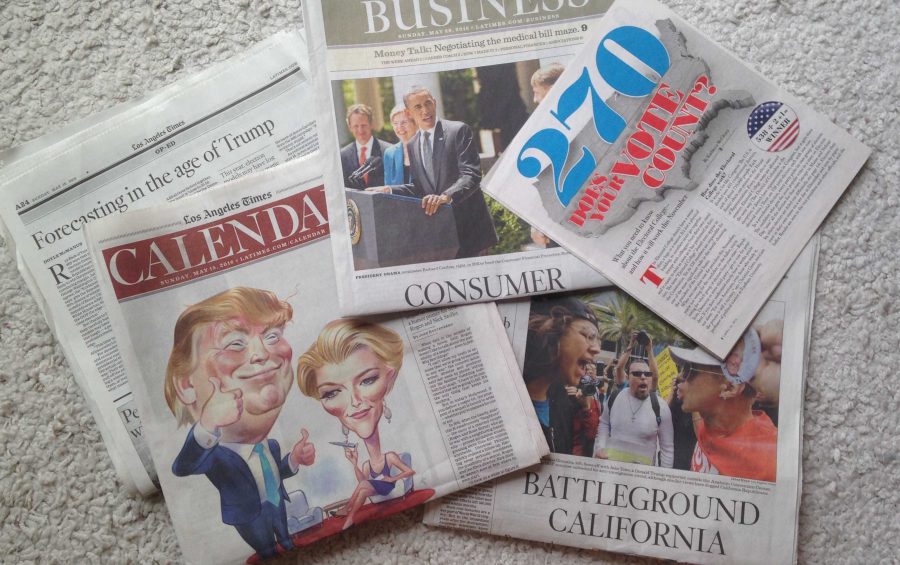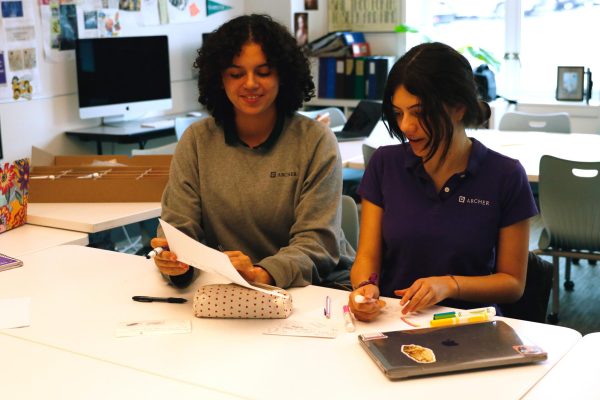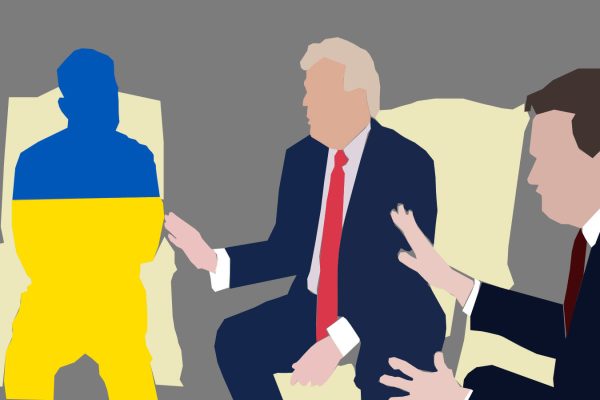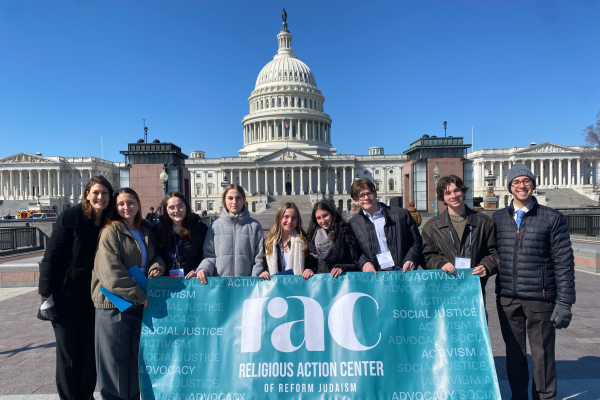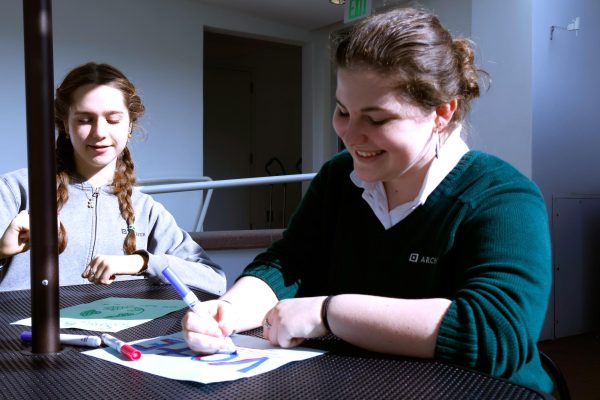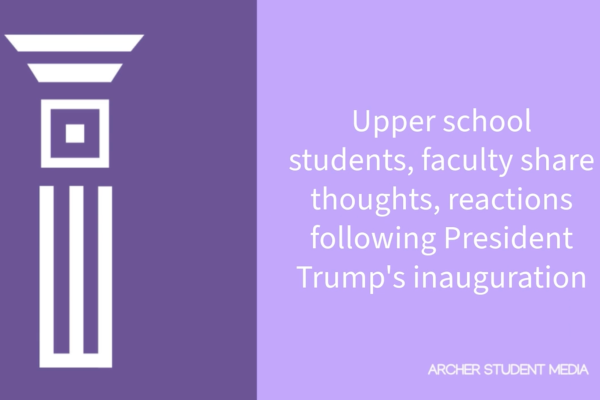Coming Out Conservative: Being Republican at Archer
Photo credit: Cybele Zhang
LA Times articles about the 2016 election. Politics is an ever present topic in the media, but at Archer some conservative students are reluctant to share their views.
Cameron Thompson ’18 has never fully expressed her political opinions in class at Archer.
Thompson said her political perspectives are “moderate leaning towards conservative”; however, most of her family members identify as Republicans.
She said that she began to feel uncomfortable when discussing politics at Archer during the 2012 presidential election. Since then, she has mostly kept quiet about her political beliefs because of her fear of others’ perceptions of her.
“I fear that once I share conservative views, I’m going to get labeled. Labeling just comes with a whole host of certain stigmas that you’re anti-gay [or] you want to steal everyone’s money. If people really understood that that’s not what all Republicans believe then there would be more acceptance,” she said.
“I always come home to my family and say, ‘You know what? I can’t take it anymore at Archer. It’s so hard, I feel like I just can’t say anything because I know I’ll be labeled,'” she said. “Literally, though, I feel like the elephant in the room.”
The teacher’s role in facilitating political diversity
History Department Chair Lucy Pinkwater has taught government and elections and eighth grade United States history while at Archer. Pinkwater believes that it is a “total misconception” that everyone in the Archer community is a liberal. In order to overcome this misconception, she suggests talking about the issue in the classroom openly.
“You have to start by explaining to the whole class that, believe it or not, you are in a diverse political classroom. People’s ideals, while stemming from their homes, are very personal, and you cannot make assumptions,” she said.
She believes that current events, especially during a major election cycle, play an important role in the classroom.
“A very important aspect of our department is keeping our students current on what is happening in the world around them,” Pinkwater said. “[Current events] shouldn’t be arbitrary; they should actually enrich their understanding.”
As a teacher, Pinkwater believes that her personal politics should not be relevant in the classroom.
“As educators, it is not our responsibility to sway voters, it’s our responsibility to present both sides of an issue,” she said.
In her role as department chair, Pinkwater instructs all history teachers on how to teach politics.
“The conversation I have with teachers is to not participate but to educate your students on why it’s important to remain unbiased. Students often feel isolated in the classroom and feel confused as to why their parents’ beliefs are not mainstream within their school, and that can be really hurtful for a student.”
This conversation often arises during professional development, but more so during an election cycle.
All teachers interviewed said that students’ political ideologies stem from their families’ beliefs and are shaped by communities like Archer.
“Your political ideology at your age comes from your home, your religious affiliation — it comes from your community. You yourself might not know if you are a true Democrat or a true Republican, but you know that you are likely in line with what your parents believe,” Pinkwater said.
Pinkwater understands that politics can be a very personal and divisive issue.
“Politics can be very touchy on a personal level because people have very specific reasons why they vote. Some people vote with their checkbooks, some people vote with their hearts and some people vote based on religious morals. Don’t assume everyone agrees with you,” she said.
A common misconception
A common misconception that both students and teachers discussed is that people vote only for cultural reasons. However, Pinkwater believes that many Archer families hold more conservative beliefs for other reasons, such as economics.
“Most of our students see [politics] as a very social issue,” she said, but, “a lot of the social issues are tied to religion too, and that’s where we have to be very careful with how we talk about it in the classroom.”
Similarly, she believes that Archer’s location on the west side of Los Angeles should “absolutely” not affect the teaching.
“My goal is to teach students what it means to be a Republican, what it means to be a Democrat, what it means to be an independent,” she said. “My goal is to teach students how to be informed on the issues and how to vote in a way that is effective for them. How to make change within their communities at all levels.”
History teacher and diversity club adviser Beth Gold discusses issues relating to politics with her students frequently. Gold uses current events to illustrate patterns in history and understand how important elections can be when studying topics like ethics. For Gold, current events are a way to convey her “interest in the world.”
“I want my students to form opinions and to think and care about their world and come to whatever decision they want to. My interest and passion for being an active member of society should come through. I think it’s our job to educate and make you informed citizens that want to participate,” Gold said.
However, Gold is “very aware” of the tension that exists for students who are in the political minority.
“This is an extremely liberal community, so students who are not part of that mainstream opinion constantly feel marginalized,” she said.
When a student tries to express an opposing viewpoint, Gold says, she tries to give them moral support so that she doesn’t witness any “disrespect or bullying from the louder voices in the class.”
Gold acknowledged the value of opposing viewpoints coming directly from students. She said that a student’s voice is “so much more powerful in that conversation than my voice.”
The annual Assessment of Inclusivity and Multiculturalism survey includes quantitative data as well as qualitative information from focus groups. From last year’s survey, an Archer focus group demonstrated that some students and teachers who have religious and political beliefs that are out of the mainstream here don’t feel comfortable sharing them.
Gold believes that the best way to move forward is to continue to talk about issues that make students uncomfortable in a respectful way.
“It’s about discourse. I think that is what makes us feel invested in our society – talking to other people, finding commonalities. That’s a really important part of people’s journey of figuring out who they are and what they think. It’s about having conversations and learning from each other, instead of convincing everyone that your way is the only way,” she said.
Challenging preconceptions
History Teacher Meg Shirk teaches a unit on government, politics and power in her 9th grade classes.
“It’s really a time to dig deep, truly understand our own beliefs and relate that to politics. Part of that is really challenging because political beliefs are very personal,” she said. “It gives me hope in the sense that my 9th graders are talking about this, right at the beginning of high school. Hopefully with more thought and more focus on this issue, in and of itself, I’ll be able to change the rest of their high school experience.”
Shirk acknowledged the fact that some students are more receptive to new beliefs than are others. However, she hopes that the students can think critically and make their own decisions.
“They think they have it all figured out. But my job as their teacher is to question their beliefs,” Shirk said.
Shirk said that dealing with politics in the classroom is a learning experience for her as well.
“I’m constantly looking for feedback and trying to challenge myself because it is hard to navigate,” she said. “While the left, liberals, proclaim to be so accepting and open-minded, they become closed off to the opposite side of the [political] spectrum — they’re hypocrites, essentially.”
For Shirk, the most important thing is to teach students the required tools to have “productive conversations” where students with differing opinions can be respected.
However, she acknowledges the paradox between a school founded on progressive ideals like feminism and one that aims to respect all opinions.
“Archer as a whole is a progressive institution. The nature of how we teach is progressive and the topics that we talk about are progressive,” she said. “When you talk about women’s reproductive issues, [students] go ballistic because they are so passionate.I love to see the passion, but at the same time, there may be students in the class who are a little bit more conservative or religious.”
Shirk hopes that Archer will create more professional development opportunities for teachers to learn about this issue. She also hopes that students who hold the minority opinion will feel comfortable speaking out.
“It’s really important to be an advocate for yourself and if you feel uncomfortable with a conversation, to address it with a teacher. Because teachers can’t make changes unless students speak up,” Shirk said.
Coming out conservative
Cairo Dwek ’16 holds both conservative and liberal perspectives on a number of issues.
“There’s this assumption that people who are conservative are mean, selfish, racist and prejudiced. I strongly believe in gay marriage, I strongly believe in abortion and I believe that society is obligated to help those who are least well off,” Dwek said.
Dwek’s family and home life have shaped her opinions and values. At the same time, the Archer community has greatly influenced the beliefs of her family.
“I’ve been able to change my parents’ opinions as well,” she said. “My parents used to not be for gay marriage — I literally made them [support] gay marriage.”
Seaf Hartley ’16 echoes this sentiment.
“If you have a hint of conservatism, then you are automatically looked at as someone who is conservative, who’s racist, who doesn’t believe in women’s rights, who doesn’t believe in gay rights and that’s just not true,” she said.
“Don’t necessarily think that all Republicans are so radical, because we’re not,” Thompson said. “I’m coming out as conservative, and it’s a big deal to me. I didn’t know if I should ever say my opinion – ever at Archer. I’m sick of that. Why can everyone talk about [politics] but me? Sometimes it’s nice to hear a counter argument once in a while.”
She said that sometimes in her classes it seems like a competition for how much one can “bash on the Republicans.”
“Once the Archer community realizes that not all Republicans think a certain way,” she said, “there can be [a] breaking of this label.”
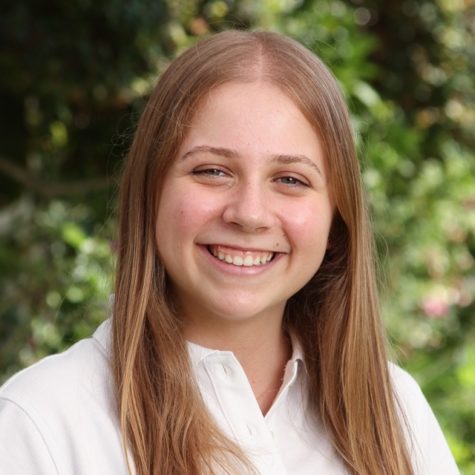
Syd Stone graduated in 2016. She became the Voices Editor and the Social Media Manager during the 2013-2014 school year and continued in that position...



